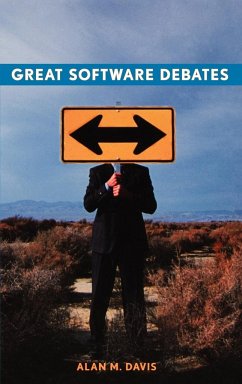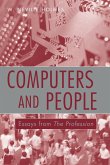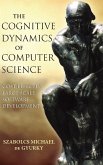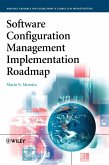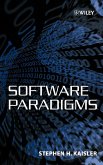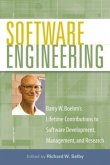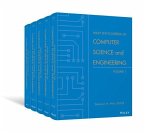Readers will benefit from 25 years of software development experience without having to relive it. The book is a collection of essays presenting proven ideas on how to approach the difficult task of constructing software. Software practitioners who are in desperate need of sound, palatable advice will find this book a valuable reference. The book is also appropriate for graduate-level students of software engineering who need a concise glimpse into the software engineering field.
The industry's most outspoken and insightful critic explains how the software industry REALLY works.
In Great Software Debates, Al Davis, shares what he has learned about the difference between the theory and the realities of business and encourages you to question and think about software engineering in ways that will help you succeed where others fail.
In short, provocative essays, Davis fearlessly reveals the truth about process improvement, productivity, software quality, metrics, agile development, requirements documentation, modeling, software marketing and sales, empiricism, start-up financing, software research, requirements triage, software estimation, and entrepreneurship. He will get you thinking about:
_ The danger of following trends and becoming a 'software lemming'
_ Is software development art or engineering?
_ How to survive management mistakes
_ The bizarre world of software estimation
_ How to succeed as software entrepreneur
_How to resolve incompatible schedules and requirements
If you are in the software industry and do not know which way to turn, Great Software Debates provides valuable and insightful advice. Whether you are a software developer, software manager, software executive, entrepreneur, requirements writer, architect, designer, or tester, you will find no shortage of sound, palatable advice.
Hinweis: Dieser Artikel kann nur an eine deutsche Lieferadresse ausgeliefert werden.
The industry's most outspoken and insightful critic explains how the software industry REALLY works.
In Great Software Debates, Al Davis, shares what he has learned about the difference between the theory and the realities of business and encourages you to question and think about software engineering in ways that will help you succeed where others fail.
In short, provocative essays, Davis fearlessly reveals the truth about process improvement, productivity, software quality, metrics, agile development, requirements documentation, modeling, software marketing and sales, empiricism, start-up financing, software research, requirements triage, software estimation, and entrepreneurship. He will get you thinking about:
_ The danger of following trends and becoming a 'software lemming'
_ Is software development art or engineering?
_ How to survive management mistakes
_ The bizarre world of software estimation
_ How to succeed as software entrepreneur
_How to resolve incompatible schedules and requirements
If you are in the software industry and do not know which way to turn, Great Software Debates provides valuable and insightful advice. Whether you are a software developer, software manager, software executive, entrepreneur, requirements writer, architect, designer, or tester, you will find no shortage of sound, palatable advice.
Hinweis: Dieser Artikel kann nur an eine deutsche Lieferadresse ausgeliefert werden.
"The author shares what he has learned about the difference between business theory and reality, encouraging readers to think about software engineering in ways that will help them succeed where others fail." (Computer Magazine, November 2004)
"'Great Software Debates' is a gift of Alan Davis' experience, insight, wisdom, and humor. The essays' value is greatly increased by being collected in one place." (IEEE Software, November/December 2006)
"...hardly a week has gone by that I have not referenced it or recommended it to co-workers and friends...a concentrated treasure of suggestions, explanations, and principles." (Ubiquity, October 19, 2005)
"...expect[s] that the reader will think about and react to the content in some substantive way." (Software Quality Professional, March 2005)
"This book deserves a place on any software engineer's bookshelf...it will make you keep your brain in gear, an essential quality for software engineers..." (Computing Reviews.com, March 11, 2005)
"The author shares what he has learned about the difference between business theory and reality, encouraging readers to think about software engineering in ways that will help them succeed where others fail." (Computer Magazine, November 2004)
"...hardly a week has gone by that I have not referenced it or recommended it to co-workers and friends...a concentrated treasure of suggestions, explanations, and principles." (Ubiquity, October 19, 2005)
"...expect[s] that the reader will think about and react to the content in some substantive way." (Software Quality Professional, March 2005)
"This book deserves a place on any software engineer's bookshelf...it will make you keep your brain in gear, an essential quality for software engineers..." (Computing Reviews.com, March 11, 2005)
"The author shares what he has learned about the difference between business theory and reality, encouraging readers to think about software engineering in ways that will help them succeed where others fail." (Computer Magazine, November 2004)

